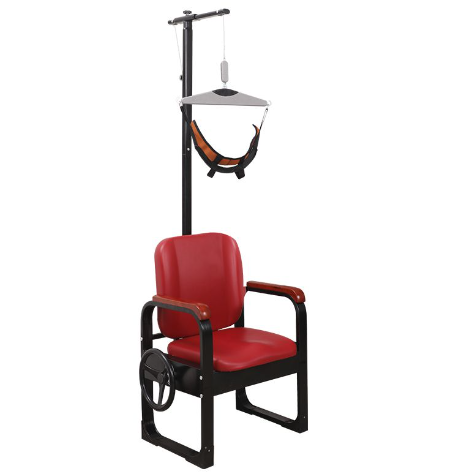Traction chairs are devices that are commonly used in physical therapy clinics and chiropractic offices. They are designed to provide traction, or a stretching force, to the spine in order to relieve back pain and other spinal conditions. While traction chairs are generally considered safe, there are certain risks associated with their use that should be considered.
One of the primary concerns with traction chairs is the risk of injury to the spine or other parts of the body. When using a traction chair, the patient's spine is stretched and decompressed, which can put stress on the vertebrae and other structures of the spine. If the traction force is too high or applied incorrectly, it can cause damage to the spine, nerves, or other tissues.
Another potential risk associated with traction chairs is the risk of blood clots. When a patient is in a seated position for an extended period of time, blood can pool in the legs and increase the risk of developing a blood clot. This risk can be minimized by taking breaks from the traction chair and moving around periodically.

In addition to the risks associated with the use of traction chairs, there are also certain medical conditions that may make their use unsafe. Patients with certain spinal conditions, such as spinal fractures or instability, may be at increased risk of injury from traction. Patients with certain medical conditions, such as blood clotting disorders, may also be advised to avoid traction therapy.
Despite these risks,Youjian traction chairs are generally considered safe when used under the guidance of a qualified healthcare professional. The healthcare provider should assess the patient's medical history, current condition, and any potential risks before recommending traction therapy. They should also closely monitor the patient during the treatment session to ensure that the traction force is applied correctly and is not causing any adverse effects.
It is also important for patients to communicate any discomfort or pain they may be experiencing during traction therapy to their healthcare provider. If a patient experiences any adverse effects, such as severe pain or numbness, the treatment should be stopped immediately.
In conclusion, traction chairs can be a safe and effective treatment option for patients with certain spinal conditions. However, there are potential risks associated with their use, including the risk of injury to the spine or other parts of the body, and the risk of blood clots. Patients should only undergo traction therapy under the guidance of a qualified healthcare professional who can assess their medical history and current condition, monitor them during the treatment session, and address any concerns or adverse effects that may arise. With proper use and monitoring, traction chairs can provide significant pain relief and improve overall spinal health.Learn more
Comments
Please Join Us to post.
0